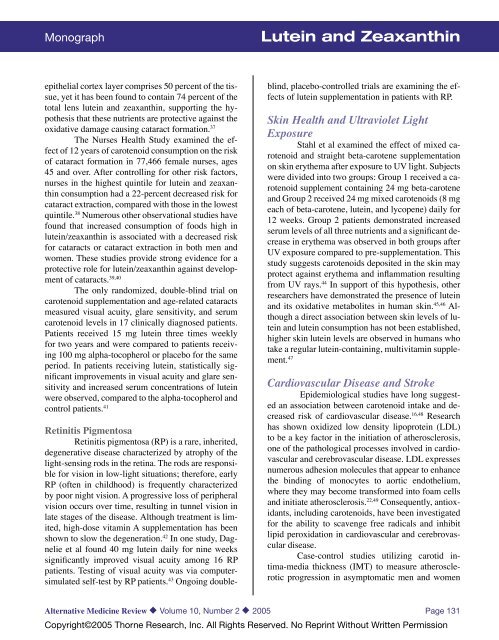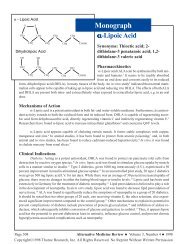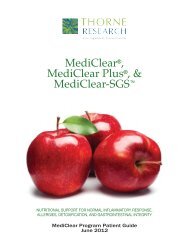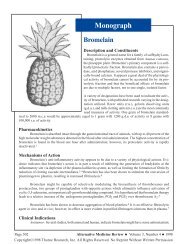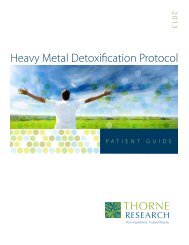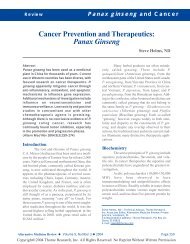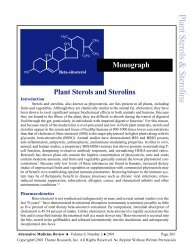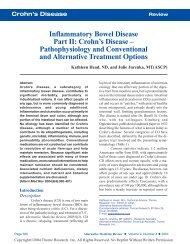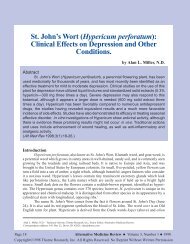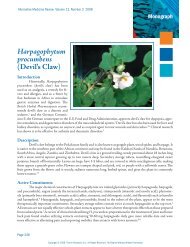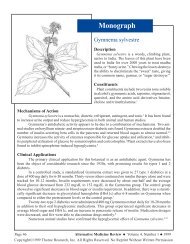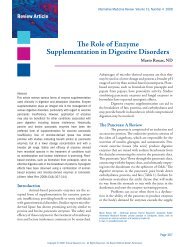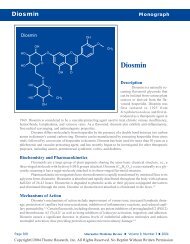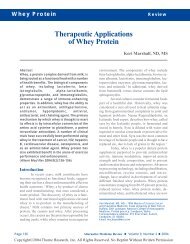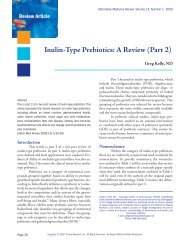Lutein and Zeaxanthin - Thorne Research
Lutein and Zeaxanthin - Thorne Research
Lutein and Zeaxanthin - Thorne Research
You also want an ePaper? Increase the reach of your titles
YUMPU automatically turns print PDFs into web optimized ePapers that Google loves.
Monograph<br />
<strong>Lutein</strong> <strong>and</strong> <strong>Zeaxanthin</strong><br />
epithelial cortex layer comprises 50 percent of the tissue,<br />
yet it has been found to contain 74 percent of the<br />
total lens lutein <strong>and</strong> zeaxanthin, supporting the hypothesis<br />
that these nutrients are protective against the<br />
oxidative damage causing cataract formation. 37<br />
The Nurses Health Study examined the effect<br />
of 12 years of carotenoid consumption on the risk<br />
of cataract formation in 77,466 female nurses, ages<br />
45 <strong>and</strong> over. After controlling for other risk factors,<br />
nurses in the highest quintile for lutein <strong>and</strong> zeaxanthin<br />
consumption had a 22-percent decreased risk for<br />
cataract extraction, compared with those in the lowest<br />
quintile. 38 Numerous other observational studies have<br />
found that increased consumption of foods high in<br />
lutein/zeaxanthin is associated with a decreased risk<br />
for cataracts or cataract extraction in both men <strong>and</strong><br />
women. These studies provide strong evidence for a<br />
protective role for lutein/zeaxanthin against development<br />
of cataracts. 39,40<br />
The only r<strong>and</strong>omized, double-blind trial on<br />
carotenoid supplementation <strong>and</strong> age-related cataracts<br />
measured visual acuity, glare sensitivity, <strong>and</strong> serum<br />
carotenoid levels in 17 clinically diagnosed patients.<br />
Patients received 15 mg lutein three times weekly<br />
for two years <strong>and</strong> were compared to patients receiving<br />
100 mg alpha-tocopherol or placebo for the same<br />
period. In patients receiving lutein, statistically significant<br />
improvements in visual acuity <strong>and</strong> glare sensitivity<br />
<strong>and</strong> increased serum concentrations of lutein<br />
were observed, compared to the alpha-tocopherol <strong>and</strong><br />
control patients. 41<br />
Retinitis Pigmentosa<br />
Retinitis pigmentosa (RP) is a rare, inherited,<br />
degenerative disease characterized by atrophy of the<br />
light-sensing rods in the retina. The rods are responsible<br />
for vision in low-light situations; therefore, early<br />
RP (often in childhood) is frequently characterized<br />
by poor night vision. A progressive loss of peripheral<br />
vision occurs over time, resulting in tunnel vision in<br />
late stages of the disease. Although treatment is limited,<br />
high-dose vitamin A supplementation has been<br />
shown to slow the degeneration. 42 In one study, Dagnelie<br />
et al found 40 mg lutein daily for nine weeks<br />
significantly improved visual acuity among 16 RP<br />
patients. Testing of visual acuity was via computersimulated<br />
self-test by RP patients. 43 Ongoing doubleblind,<br />
placebo-controlled trials are examining the effects<br />
of lutein supplementation in patients with RP.<br />
Skin Health <strong>and</strong> Ultraviolet Light<br />
Exposure<br />
Stahl et al examined the effect of mixed carotenoid<br />
<strong>and</strong> straight beta-carotene supplementation<br />
on skin erythema after exposure to UV light. Subjects<br />
were divided into two groups: Group 1 received a carotenoid<br />
supplement containing 24 mg beta-carotene<br />
<strong>and</strong> Group 2 received 24 mg mixed carotenoids (8 mg<br />
each of beta-carotene, lutein, <strong>and</strong> lycopene) daily for<br />
12 weeks. Group 2 patients demonstrated increased<br />
serum levels of all three nutrients <strong>and</strong> a significant decrease<br />
in erythema was observed in both groups after<br />
UV exposure compared to pre-supplementation. This<br />
study suggests carotenoids deposited in the skin may<br />
protect against erythema <strong>and</strong> inflammation resulting<br />
from UV rays. 44 In support of this hypothesis, other<br />
researchers have demonstrated the presence of lutein<br />
<strong>and</strong> its oxidative metabolites in human skin. 45,46 Although<br />
a direct association between skin levels of lutein<br />
<strong>and</strong> lutein consumption has not been established,<br />
higher skin lutein levels are observed in humans who<br />
take a regular lutein-containing, multivitamin supplement.<br />
47<br />
Cardiovascular Disease <strong>and</strong> Stroke<br />
Epidemiological studies have long suggested<br />
an association between carotenoid intake <strong>and</strong> decreased<br />
risk of cardiovascular disease. 16,48 <strong>Research</strong><br />
has shown oxidized low density lipoprotein (LDL)<br />
to be a key factor in the initiation of atherosclerosis,<br />
one of the pathological processes involved in cardiovascular<br />
<strong>and</strong> cerebrovascular disease. LDL expresses<br />
numerous adhesion molecules that appear to enhance<br />
the binding of monocytes to aortic endothelium,<br />
where they may become transformed into foam cells<br />
<strong>and</strong> initiate atherosclerosis. 22,49 Consequently, antioxidants,<br />
including carotenoids, have been investigated<br />
for the ability to scavenge free radicals <strong>and</strong> inhibit<br />
lipid peroxidation in cardiovascular <strong>and</strong> cerebrovascular<br />
disease.<br />
Case-control studies utilizing carotid intima-media<br />
thickness (IMT) to measure atherosclerotic<br />
progression in asymptomatic men <strong>and</strong> women<br />
Alternative Medicine Review ◆ Volume 10, Number 2 ◆ 2005 Page 131<br />
Copyright©2005 <strong>Thorne</strong> <strong>Research</strong>, Inc. All Rights Reserved. No Reprint Without Written Permission


